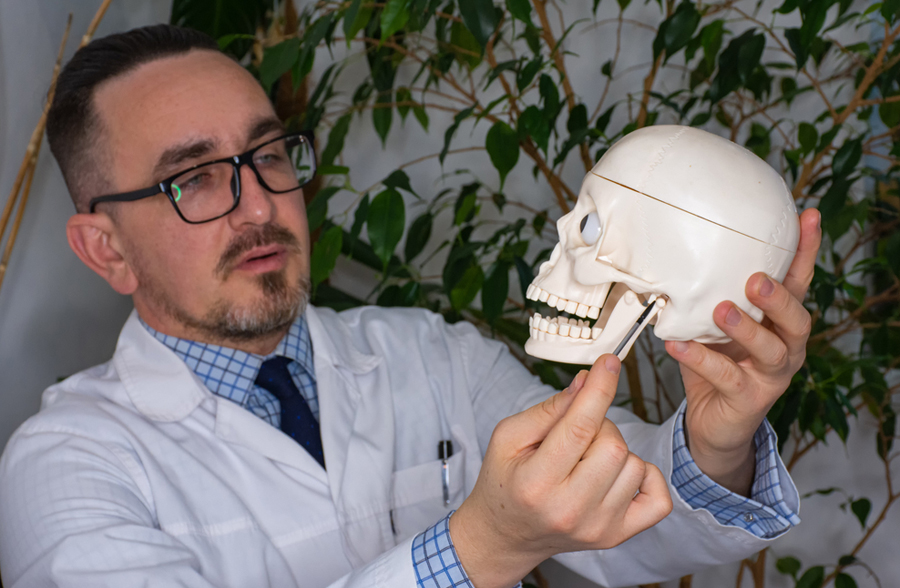Temporomandibular joint (TMJ) disorders are conditions affecting the jaw joint and surrounding muscles. These disorders can cause discomfort, pain, and difficulty in everyday activities such as chewing, speaking, and even yawning. While TMJ disorders have various causes, orthodontic treatments can play a significant role in alleviating symptoms and improving jaw function.
At My LA Braces, we specialize in advanced orthodontic care, including treatments that address the underlying causes of TMJ disorders. Understanding the connection between TMJ issues and orthodontics can help patients make informed decisions about their care.
Understanding TMJ Disorders
The temporomandibular joint connects your jawbone to your skull, enabling essential movements such as opening and closing your mouth. TMJ disorders arise when this joint and its supporting structures are damaged or misaligned. Common causes of TMJ disorders include:
- Jaw Misalignment: When teeth or jaws are not properly aligned, the temporomandibular joint may be placed under undue stress.
- Bruxism (Teeth Grinding): Chronic grinding or clenching of teeth can strain the TMJ and surrounding muscles.
- Injury or Trauma: Accidents involving the jaw can damage the joint and lead to TMJ issues.
- Arthritis: Degenerative conditions like osteoarthritis or rheumatoid arthritis can affect the TMJ.
Symptoms of TMJ disorders include jaw pain, difficulty opening or closing the mouth, clicking or popping sounds in the joint, and headaches. In severe cases, TMJ disorders can impact quality of life, making effective treatment essential.
How Orthodontics Can Help Treat TMJ Disorders
Orthodontics focuses on diagnosing, preventing, and correcting misalignments of the teeth and jaws. For patients with TMJ disorders, orthodontic treatments can be instrumental in addressing the root causes of their condition. Here’s how:
1. Correcting Malocclusion (Bad Bite)
A misaligned bite can cause excessive strain on the temporomandibular joint, contributing to TMJ issues. Orthodontic treatments like braces or Invisalign can realign the teeth, promoting a balanced bite and reducing joint stress.
2. Aligning the Jaws
Orthodontic appliances such as braces or headgear can adjust the positioning of the upper and lower jaws. Proper jaw alignment can alleviate TMJ symptoms by evenly distributing pressure across the joint.
3. Reducing Teeth Grinding and Clenching
Bruxism is often linked to TMJ disorders. Orthodontic solutions, including retainers or bite guards, can prevent teeth grinding and protect the TMJ from excessive wear and tear.
4. Improving Jaw Function
Orthodontic care helps optimize how the jaw functions, improving chewing, speaking, and overall comfort. By addressing underlying structural issues, orthodontics can lead to long-term relief from TMJ symptoms.
Orthodontic Treatment Options for TMJ Disorders
Several orthodontic approaches may be recommended to treat TMJ disorders, depending on the severity and underlying causes of the condition:
- Braces: Traditional metal braces or clear aligners like Invisalign can correct misaligned teeth and improve bite alignment.
- Bite Guards: Customized bite guards or splints can reduce teeth grinding and relieve TMJ stress.
- Palate Expanders: In cases where the upper jaw is too narrow, palate expanders can create more space and improve jaw alignment.
- Surgical Orthodontics: For severe cases, a combination of orthodontic treatment and surgery may be necessary to reposition the jaw and address TMJ issues.
Benefits of Orthodontic Treatment for TMJ Disorders
Orthodontic treatment offers multiple benefits for patients with TMJ disorders, including:
- Pain Relief: Reduced strain on the TMJ can alleviate jaw pain, headaches, and muscle tension.
- Improved Functionality: Proper alignment of the teeth and jaw enhances chewing, speaking, and overall jaw mobility.
- Prevention of Future Issues: Addressing structural problems early can prevent TMJ symptoms from worsening over time.
- Enhanced Quality of Life: Orthodontic care can restore comfort and confidence by resolving TMJ-related discomfort.
When Should You See an Orthodontist for TMJ Disorders?
If you experience persistent jaw pain, clicking or popping sounds, or difficulty opening or closing your mouth, it’s important to consult an orthodontist. Early intervention can prevent further joint damage and improve your overall oral health.
How We Can Help
At My LA Braces, we are dedicated to providing comprehensive orthodontic solutions, including treatments for TMJ disorders. As the highest-ranked orthodontic office in East Los Angeles, we specialize in personalized care for kids, teens, and adults. Whether you’re considering Invisalign, braces, or other orthodontic options, our experienced team is here to help you achieve a healthier, more comfortable smile.
Contact us today to schedule a consultation and learn how we can help address your TMJ concerns. Let us guide you on the path to lasting relief and improved oral health.

